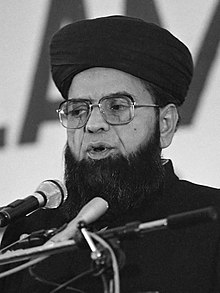- 1 2 3 4 5 6 7 Wasim, Amir (12 December 2003). "Maulana Noorani passes away: Funeral prayers at Nishtar Park today". Dawn (newspaper). Archived from the original on 3 March 2016. Retrieved 15 August 2022.
- 1 2 "Qaid-e-Ahl Sunnat His Eminence Maulana Shah Ahmad Noorani Siddiqui Al-Qadiri (RA) Rahmatullah alaih (1926–2003)". Noorani. Archived from the original on 17 May 2014. Retrieved 15 August 2022.
- 1 2 "Leaders vow to continue Noorani's mission". Dawn (newspaper). 19 January 2004. Archived from the original on 15 August 2022. Retrieved 15 August 2022.
- ↑ Zia Ur Rehman (3 March 2016). "In Qadri's fate, Barelvis see their redemption". The News International (newspaper). Archived from the original on 19 April 2022. Retrieved 15 August 2022.
- 1 2 3 4 5 Hussain, Shahid (12 December 2003). "Noorani dies of a heart attack". GUlf News. Archived from the original on 11 October 2012. Retrieved 15 August 2022.
- 1 2 "Shah Ahmed Noorani's death shocks MMA leaders". Daily Times. 12 December 2003. Archived from the original on 24 September 2005. Retrieved 15 August 2022.
- ↑ "World Islamic Mission: Mauritius Branch – Maulana Shah Ahmad Noorani Siddiqui Al-Qaderi". Islamic Mission. 4 March 2010. Archived from the original on 22 March 2016. Retrieved 15 August 2022.
- ↑ Obituary in Impact International, volume 34, n° 4, 2004
- ↑ Abzahir Khan, Muhammad Idrees, Akhtar Hussain (26 July 2016). "Mawlana Shah Ahmad Noorani: His Role in the Restoration of Parliamentary Democracy in Pakistan, 1977-200". Vfast Transactions on Islamic Research. 4 (1): 27–38. Archived from the original on 18 September 2023. Retrieved 15 August 2022.
{{cite journal}}: CS1 maint: multiple names: authors list (link) - ↑ EMERGENCE OF RELIGIO-POLITICAL LANDSCAPE IN PAKISTAN AND SWAY AND DISMAY OF THE RIGHTIST JAM’IYYAT ULEMA-I-PAKISTAN-JUP (1970-2003) Dr. Mazher Hussain The Islamia University of Bahawalpur, Pakistan Muhammad Anwar Farooq The Islamia University of Bahawalpur, Pakistan IJSSHE-International Journal of Social Sciences, Humanities and Education Volume 1, Number 3, 2017 ISSN 2521-0041
This page is based on this Wikipedia article
Text is available under the CC BY-SA 4.0 license; additional terms may apply.
Images, videos and audio are available under their respective licenses.
Text is available under the CC BY-SA 4.0 license; additional terms may apply.
Images, videos and audio are available under their respective licenses.
Shah Ahmad Noorani | |
|---|---|
 Ahmad Noorani in 1985 | |
| President of the Muttahida Majlis-e-Amal | |
| In office 9 October 2002 –11 December 2003 |